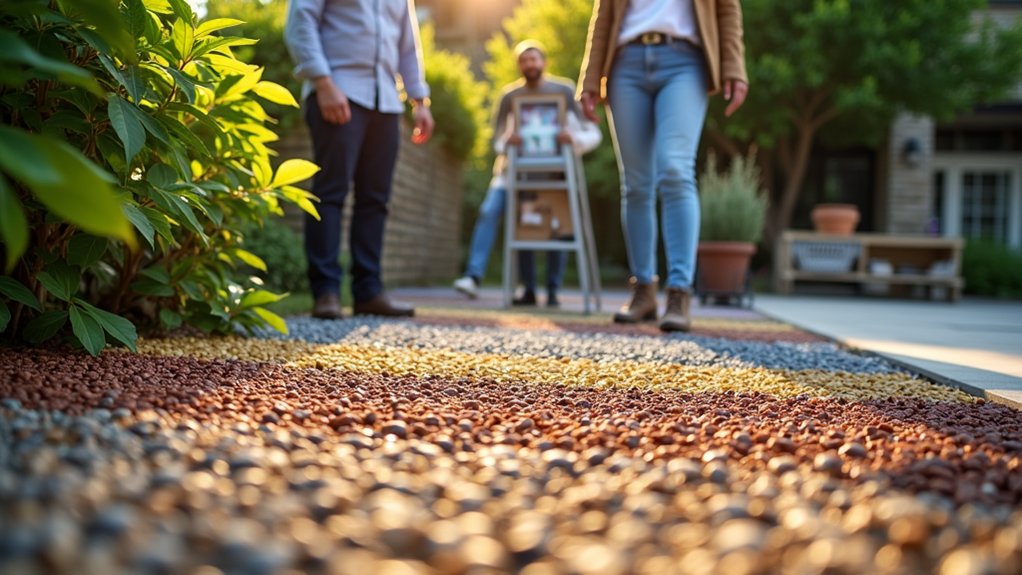Choosing a Reliable Resin-Bound Gravel Supplier
Look for suppliers with solid UK experience and proper BBA certification. Any decent supplier should have strong local references and testimonials from previous jobs in your area. Their aggregates must meet British Standards – they should be properly sorted, clean and moisture-free.
Ask about their installation methods and aftercare support. Quality suppliers will explain their process clearly and offer proper maintenance guidance. Many trustworthy firms showcase their work through local projects you can visit.
Check whether they’re members of recognised trade bodies like FeRFA (The Resin Flooring Association). A genuine supplier will happily provide samples and detailed quotes without pressure.
Remember: The cheapest quote isn’t always the best value. Focus on proven track records and proper certification over bargain prices.
Key Takeaways
Check Your Resin-Bound Gravel Supplier:
- Look for BBA approval and read local reviews – particularly from projects in your area. A supplier working regularly in Manchester will better understand northern weather challenges than one based solely in Cornwall.
- Request proper test certificates for aggregates. Quality materials should meet British Standards and be thoroughly cleaned – you don’t want dusty stone ruining your new driveway.
- Pick suppliers offering solid after-care support. If something goes wrong six months later, you’ll want a team who’ll actually answer the phone and sort it.
- Verify they follow proper installation methods. Good suppliers will discuss surface prep in detail and explain their mixing process – vital for our wet British climate.
- Choose environmentally responsible companies. Those following SUDS and FeRFA guidelines typically provide better materials that cope well with UK weather whilst being kinder to the environment.
Remember: The cheapest quote often leads to costly problems later. A reputable supplier might charge more, but they’ll save you headaches down the line.
Evaluating Supplier Experience and Reliability
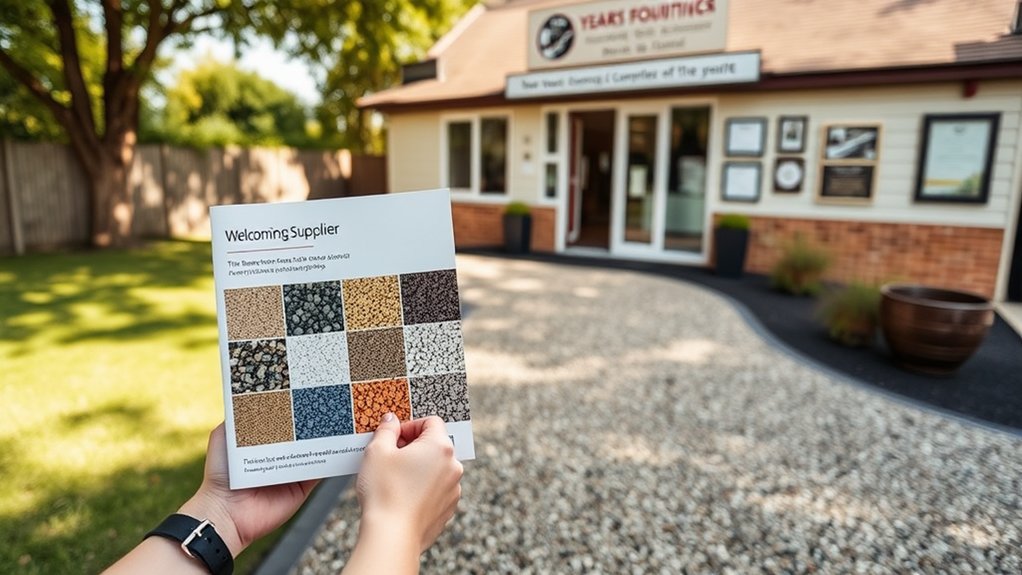
Choosing the right resin-bound gravel supplier is crucial for your project’s success. Look for companies with solid experience in the UK market – those who’ve been around for several years tend to know their stuff.
Check if they’ve BBA approval, a key UK industry standard that proves their products meet strict testing requirements. Take time to read reviews from other British customers, particularly local projects similar to yours.
A reliable supplier should offer:
- Consistent product quality
- On-time deliveries
- Clear technical guidance
- Strong financial backing
It’s worth ringing up a few of their past customers for honest feedback. Ask about delivery times, product quality and how they handled any problems. Additionally, ensure that the supplier adheres to REACH Regulations for handling diisocyanates, which is essential for health and environmental protection. Suppliers who prioritize proper surface preparation are more likely to deliver a successful installation.
A supplier who’s been serving the UK market for years, with proper certifications and happy customers, is likely your safest bet.
Don’t be swayed by bargain prices alone – focus on suppliers who can prove their reliability through local case studies and proper documentation.
Assessing Aggregate Quality
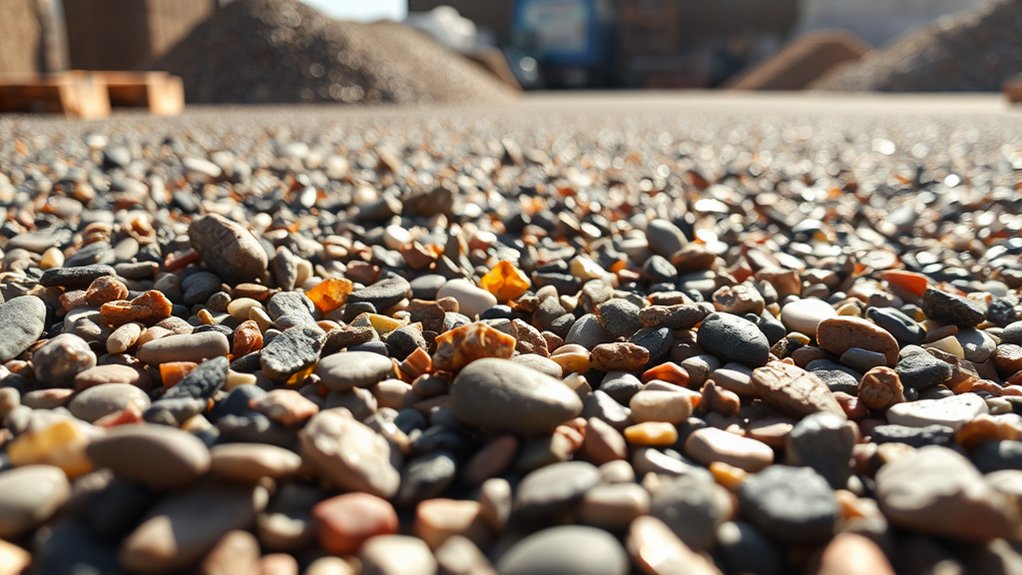
Assessing Aggregate Quality
Testing aggregate quality is vital for a lasting resin-bound gravel surface. Your aggregates must be clean, dry and free from dust to bond properly with the resin. When sourcing materials, ensure your supplier follows proper cleanliness protocols – any dirt or debris will seriously weaken the final surface. Damp aggregates are also problematic, as they won’t mix well with the resin and can affect the bond strength. Check that your chosen aggregates are strong and uniform in size, meeting British Standards for quality. A reputable UK supplier should provide test certificates and quality assurance documentation. Additionally, ensure that the aggregates are properly dried, as moisture can lead to unattractive white blooms on the surface. Some brands, like DALTEX Aggregates, guarantee their products UV-stable solutions, meaning they will resist yellowing and sun damage over time. Getting the aggregate right from the start means your resin-bound surface will look better and last longer. Remember: poor quality aggregates will always lead to poor results, no matter how well you install them.
Understanding Installation Considerations
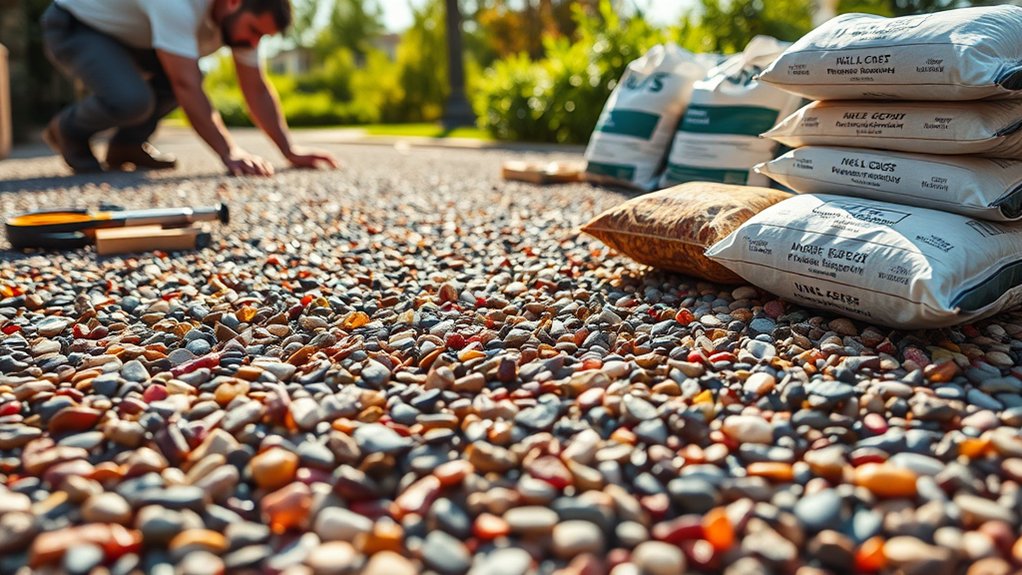
Proper installation of resin-bound gravel demands careful surface prep and precise mixing. The surface must be clean, dry and clear of debris and weeds for proper bonding. Give it a thorough clean with a pressure washer. Choose dry days for installation when ground temperature exceeds 10°C. Mixing the resin according to manufacturer specifications is critical for ensuring a strong surface. Mix the resin and aggregate exactly as your supplier specifies – think of it like baking, where the wrong measurements can spoil the whole batch. Keeping your aggregates bone-dry to avoid any curing problems is essential; a clean, dust-free area is crucial for proper bonding. Use a forced-action mixer (like a cement mixer) to blend everything evenly. Getting the resin-to-aggregate ratio spot-on is crucial – it’s the difference between a sturdy surface that lasts years and one that fails quickly.
Importance of Material Sourcing
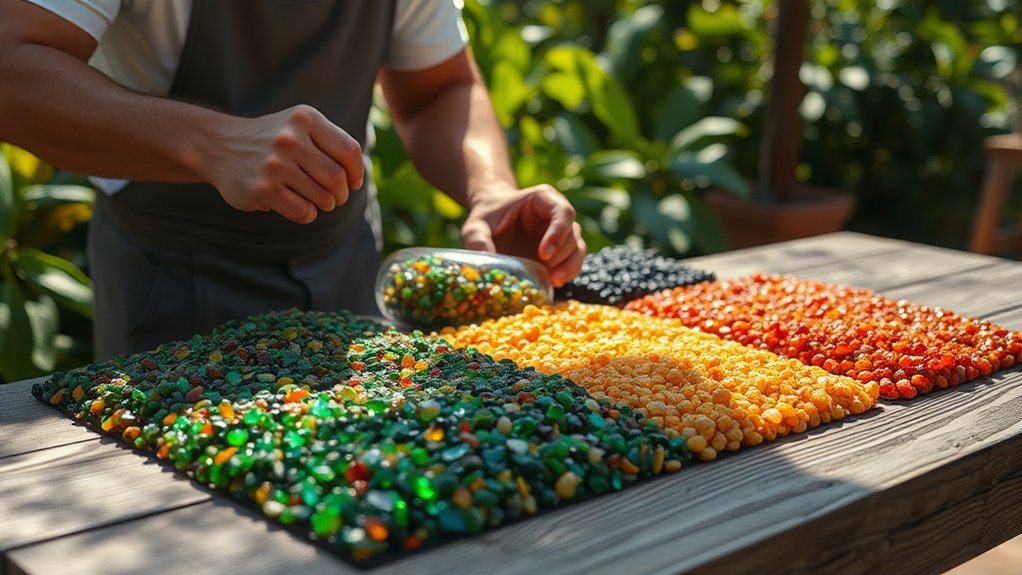
Material Sourcing: The Foundation of Quality
Proper material sourcing is vital for resin-bound gravel installations. The quality of your aggregates and resin directly affects how long your driveway or patio will last.
Working with trusted UK suppliers ensures you get properly dried, clean stones that mix well with resin.
Key benefits of good sourcing:
- Consistent materials mean better finished surfaces
- On-time deliveries keep projects moving
- Wide choice of colours and stone sizes
- Fewer problems during installation
Local suppliers often prove most reliable, offering materials tested for British weather conditions.
Whether you’re planning a garden path in Manchester or a driveway in Cornwall, sourcing quality materials from reputable suppliers makes all the difference.
Remember: skimping on material quality to save money usually leads to costly repairs later.
Checking Supplier Reputation and Guarantees

Check your supplier’s credentials and track record before committing.
Look for respected industry bodies’ approval, proper certifications and solid warranty terms.
Top UK suppliers should be registered with organisations like the Resin Flooring Association (FeRFA) and offer clear written guarantees.
Good warranties typically cover materials and workmanship for 5-10 years – anything less might raise red flags.
Ask to see examples of their previous work and speak with past customers if possible.
Industry Recognition Importance
Choosing a Reliable Resin Supplier
When selecting a resin-bound gravel supplier in the UK, their industry standing matters greatly.
Quality suppliers should tick these essential boxes:
- BBA Approval: The British Board of Agrément certification proves the product meets UK building standards
- Customer Feedback: Check reviews on Trustpilot and local trade websites
- Trade Memberships: Look for affiliations with bodies like FeRFA (The Resin Flooring Association)
- UK Standards: Must comply with current British building regulations
Top suppliers typically work with well-known UK builders and have solid track records in domestic and commercial projects.
Ask for local installation examples and recent references to verify their credentials.
Warranty and Guarantee Options
Protecting your resin-bound gravel investment starts with proper warranty coverage. The best suppliers offer guarantees of 10+ years, covering common issues like loose stones and surface cracking.
Leading UK firms, such as Resin Bound Surfaces Ltd, typically require installation by their approved teams to validate the guarantee.
Choose suppliers partnered with established manufacturers for better accountability. Check local reviews and testimonials to gauge how well companies handle warranty claims.
Good aftercare is crucial – look for suppliers with dedicated support teams who’ll sort any post-installation problems.
Keep your paperwork safe and understand the warranty terms before signing. Most reputable UK suppliers will explain their coverage clearly, helping you avoid future headaches with your driveway or patio investment.
Certifications and Compliance Standards
Checking certifications is crucial when choosing a resin-bound gravel supplier in the UK. The right accreditations ensure you’re getting a quality product that meets British standards.
Key certifications to look for:
- BBA Certification: The British Board of Agrément’s stamp proves the product meets UK construction standards
- REACH Compliance: Ensures the resin materials are safe for workers and the environment
- SUDS Compliance: Confirms the surface will drain properly in typical British weather
- FeRFA Guidelines: The Resin Flooring Association’s standards for proper installation
A properly certified supplier might cost more, but they’ll save you hassle down the line.
Think of it like MOT certification for your car – it’s essential for safety and performance.
Ask suppliers to show their current certificates and check they’re keeping up with required audits and training.
Ensuring Long-Term Durability

Maintaining Durable Resin-Bound Surfaces
Quality materials and proper installation are crucial for long-lasting resin-bound gravel surfaces. Choose premium resins and aggregates from trusted UK suppliers, as these form the foundation of a durable surface. Much like laying a proper driveway, thorough installation ensures the surface bonds correctly.
Regular upkeep is essential. Clean your surface with a pressure washer twice yearly, just as you’d maintain your patio. Apply a fresh seal coat every 3-5 years to protect against Britain’s varied weather conditions.
Watch out for common issues like UV damage and frost impact, particularly relevant in the UK climate. Ensure proper drainage to prevent standing water, which can be especially problematic during wet winters.
Check your surface periodically for any cracks or loose spots, addressing them promptly to avoid bigger problems.
These straightforward steps will significantly extend your surface’s lifespan, saving money and hassle in the long run.
Analyzing Cost vs. Value
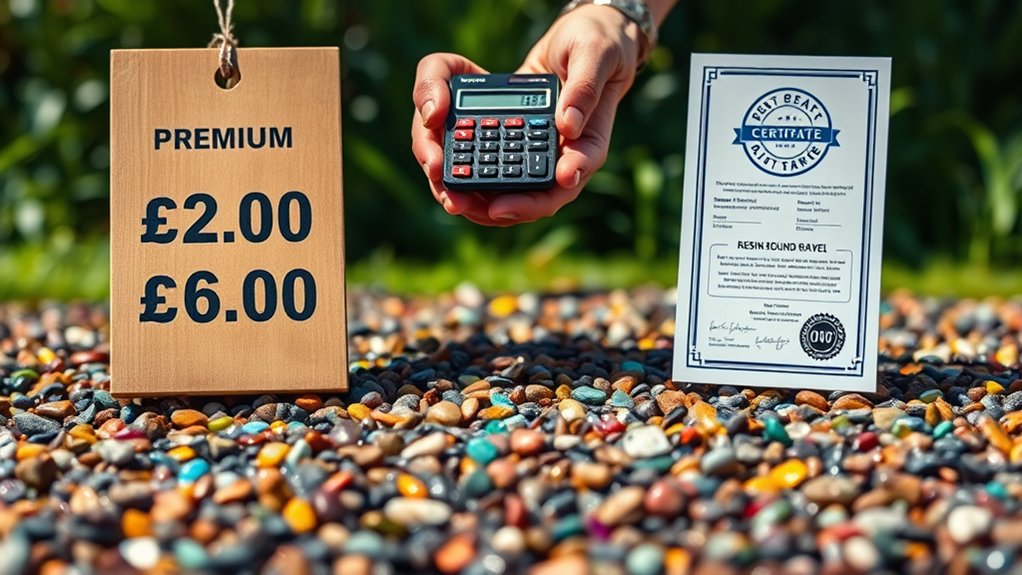
Weighing Up Cost vs. Value
When looking at resin-bound gravel surfaces, you’ll need to balance costs against long-term benefits. Installation typically costs £9 to £14 per square metre, but the true value extends beyond these initial figures.
Key benefits include:
- Boosts kerb appeal and property value
- Lasts longer than traditional gravel or concrete
- Needs minimal upkeep, saving money yearly
- Helps with drainage, meeting UK planning requirements
Think about how these factors affect your property’s worth.
While it costs more upfront than standard paving, resin-bound gravel often proves cost-effective over time. The durability and low maintenance needs make it a sensible investment for British homes and gardens.
Frequently Asked Questions
What Should I Look for in Supplier Customer Reviews?
Look for genuine reviews highlighting product quality, delivery times and customer service when assessing UK suppliers. Pay attention to feedback about reliability, material standards and communication – particularly mentions of how suppliers handle queries and issues. Recent reviews carry more weight than older ones, and patterns in feedback (both positive and negative) often reveal more than individual comments. Check if reviewers mention specific experiences with pricing, shipping to UK addresses and after-sales support.
How Can I Verify a Supplier’s Industry Certifications?
Checking a supplier’s industry certifications requires a thorough yet straightforward approach. Contact the certifying bodies directly to verify credentials, and ask the supplier for current documentation. For UK businesses, key certifications might include ISO standards, UKAS accreditation or sector-specific credentials like BRC for food suppliers. Request copies of recent audit reports and cross-reference certification numbers through official databases. A legitimate supplier will readily provide this information and welcome such due diligence.
Are There Specific Warranties for Different Resin-Bound Products?
Different resin-bound products come with varying warranty periods. For residential driveways, you’ll typically find 10-15 year warranties, whilst pedestrian areas often carry longer coverage of up to 25 years. Read the fine print carefully, as terms and conditions differ amongst manufacturers and installers across the UK.
What Are Common Installation Mistakes to Avoid?
Common resin-bound gravel mistakes to watch for: dodgy surface prep (uneven or damp surfaces), wrong mixing ratios, and laying during poor weather. A proper installation needs a stable sub-base, spot-on resin-to-aggregate proportions, and dry conditions around 10-25°C. Think of it like baking – get the basics wrong, and the whole thing’s a mess. Best to tackle the job on a clear day with a properly prepared surface for a smart, long-lasting finish.
How Do I Calculate the Amount of Materials Needed?
Calculating materials for your space:
Take precise measurements of your area in square metres. For resin bound gravel, you’ll need roughly 15-18kg of materials per square metre at a 15mm depth (standard for driveways and paths).
Example: A 20m² driveway would require:
- 300-360kg total materials
- Split into approximately 75% aggregate, 25% resin
For best results, add 10% extra to your calculations to account for wastage and variations in surface depth.
Conclusion
Selecting a reliable resin-bound gravel supplier in the UK requires careful consideration. Look for suppliers with proven track records in domestic and commercial installations, particularly those who’ve worked on projects similar to yours. Quality aggregates make all the difference – reliable suppliers will stock UV-stable materials suited to British weather conditions. Compare warranties and aftercare services, as reputable firms typically offer comprehensive coverage. Whilst cost matters, choosing solely on price often proves costly long-term. Check their membership with trade bodies like the Resin Flooring Association (FeRFA) and review local installations they’ve completed. A trustworthy supplier should readily provide references and detailed product specifications.
